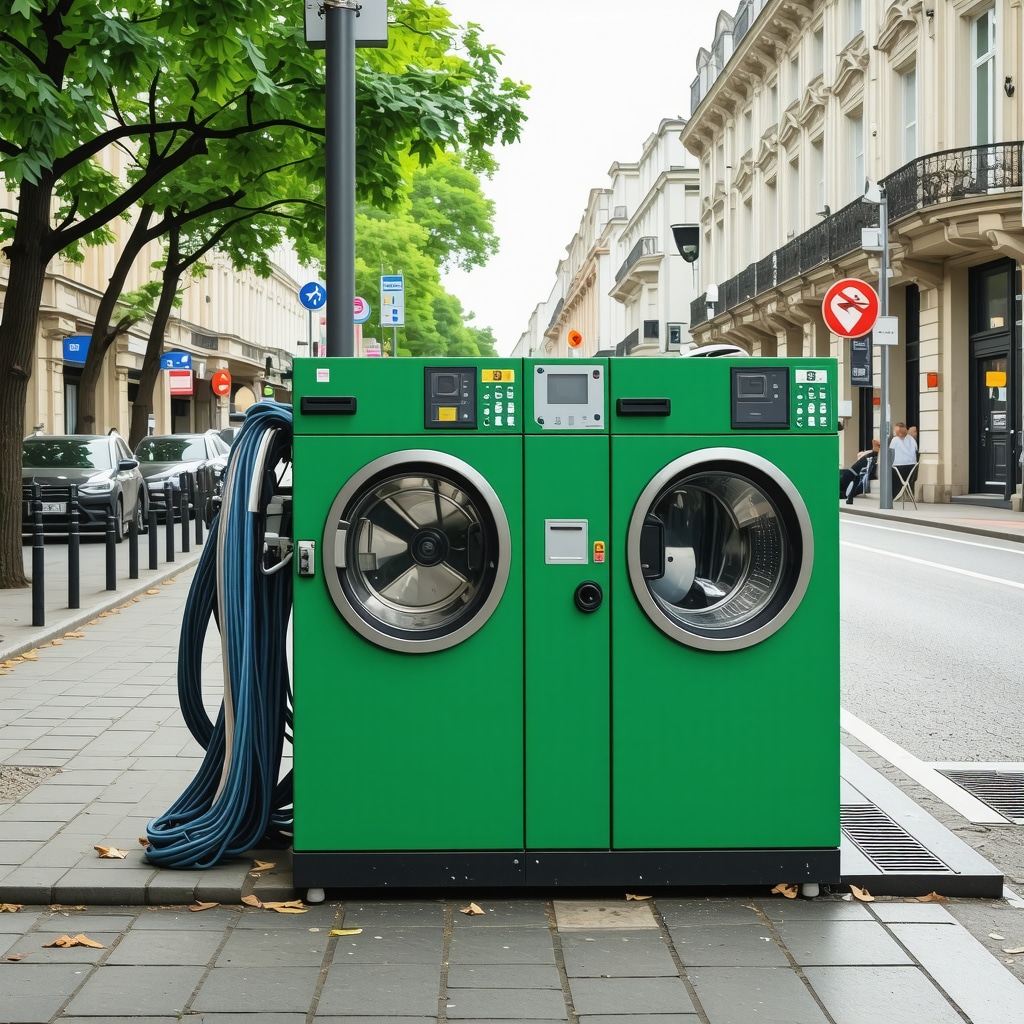My Personal Journey Toward Safer Dry Cleaning in Odessa
As someone who cherishes both my wardrobe and the environment, I was initially overwhelmed when searching for safer alternatives to traditional dry cleaning near me in Odessa. Like many, I used to rely on conventional services that often involved harsh chemicals, but my curiosity and concern for health pushed me to explore eco-friendly options.
How I Found Eco-Friendly Dry Cleaners That Care for Your Clothes and the Planet
My first step was understanding what makes a dry cleaner truly “green.” I learned that many eco-friendly options use plant-based solvents and avoid harmful chemicals like perchloroethylene, which can be detrimental to both health and the environment. I discovered local services emphasizing sustainable and non-toxic cleaning methods, such as those highlighted on eco-friendly dry cleaning.
Why Are Non-Toxic and Organic Techniques Better?
Using non-toxic cleaning solutions not only preserves the integrity of delicate fabrics but also ensures that my home stays free from chemical odors and residues. I was surprised to find that many eco-friendly dry cleaners now incorporate organic stain removal techniques, which are gentle yet effective, especially for sensitive skin. For example, I’ve switched to services that utilize organic cleaning methods, and the difference in scent and fabric feel is remarkable.
What Makes a Dry Cleaner Truly Safe for Sensitive Skin and the Environment?
One crucial aspect I learned is the importance of transparency in cleaning processes. A trustworthy eco-dry cleaner should openly share their methods and use eco-label certifications. I also looked for providers that offer hypoallergenic and scent-free options, which are perfect for those with allergies or sensitive skin. For additional assurance, I read reviews and checked their environmental policies, which often include plastic-free packaging and waste reduction practices.
How Can I Ensure My Clothes Are Clean and Safe Without Compromising My Values?
Ultimately, I found that choosing a dry cleaner that prioritizes sustainability and health benefits is essential. I now schedule regular pickups with eco-friendly services that use eco-friendly solvents and follow green practices. If you’re interested in exploring such options, I recommend visiting non-toxic dry cleaners that cater to Odessa residents.
Have you tried eco-friendly dry cleaning? Share your experiences below or tell me how you’ve managed to make your wardrobe more sustainable!
How Do Eco-Friendly Dry Cleaners Truly Protect Your Clothes and the Environment?
As a seasoned professional in sustainable fabric care, I emphasize that genuine eco-friendly dry cleaning involves more than just switching to plant-based solvents. It requires a comprehensive approach that includes eco-conscious packaging, waste reduction, and transparent practices. Many top-rated dry cleaners, such as those highlighted on eco-friendly dry cleaning, are pioneering these methods.
What Are the Critical Factors That Define a Truly Green Dry Cleaner?
First, the use of non-toxic, biodegradable solvents like liquid carbon dioxide or hydrocarbon-based solutions is essential. Second, environmentally responsible operations—such as energy-efficient machinery, water recycling, and sustainable packaging—are equally important. Third, certifications from reputable eco-labels ensure that the cleaner adheres to strict environmental standards. For example, services that utilize plant-based cleaning solvents demonstrate their commitment to sustainability.
How Can You Recognize a Dry Cleaner That Prioritizes Your Skin and the Planet?
Transparency is key. An excellent eco-dry cleaner should openly communicate their cleaning methods and hold eco-certifications. Scent-free and hypoallergenic options are particularly vital for sensitive skin, which is why I recommend looking for providers that specialize in hypoallergenic solutions. Additionally, environmentally responsible packaging, such as biodegradable garment bags, is a sign of genuine commitment.
Are There Practical Strategies for Extending Your Clothes’ Lifespan with Green Practices?
Absolutely. Regularly inspecting your garments for stains and promptly addressing them with organic stain removal techniques can significantly prolong their life. Choosing dry cleaners that emphasize zero-waste practices ensures that your clothing care aligns with broader sustainability goals. Moreover, asking your provider about their cleaning agents and waste management policies can help you make more informed decisions.
What Are the Practical Benefits of Eco-Conscious Fabric Care for Your Wardrobe?
Beyond environmental benefits, eco-friendly cleaning preserves fabric integrity, preventing premature wear and tear. It also reduces chemical residues that can cause allergic reactions or skin sensitivities, especially important if you or your family have allergies or sensitive skin. For those interested in maintaining luxury garments sustainably, I suggest exploring sustainable garment care options tailored for high-end fabrics.
If you’re eager to discover a local, trustworthy eco-dry cleaner, consider reaching out via contact page. Sharing your experiences or questions can help foster a community committed to greener fabric care. Remember, making environmentally conscious choices extends beyond the cleaning process—it’s about protecting our planet while caring for your wardrobe.

As I continued to explore the nuances of eco-friendly dry cleaning, I realized that the journey is much more layered than simply choosing plant-based solvents. It’s about cultivating a mindset that values sustainability at every step— from how clothes are handled to the packaging used and even the waste generated. This deeper understanding prompted me to ask myself: am I truly supporting a system that aligns with my values, or am I merely scratching the surface?
The Intricate Balance Between Luxury and Sustainability
One of the most compelling insights I gained is that luxury garments require specialized care, yet many high-end designers are now advocating for eco-conscious cleaning methods. I remember a conversation with a boutique owner who emphasized that sustainable fabric care does not compromise quality; instead, it often enhances longevity and maintains the garment’s integrity. For instance, some eco-friendly dry cleaners utilize luxury green dry cleaning services that are tailored for couture pieces, blending the art of preservation with environmental responsibility.
The Challenge of Transparency and Certification
Delving deeper, I found that transparency is the cornerstone of trust in this industry. Certifications from reputable eco-labels serve as vital indicators of a cleaner’s commitment to genuine sustainability. It’s one thing for a business to claim eco-friendliness, but quite another to back it up with verifiable standards. I’ve started to scrutinize certifications and ask providers about their waste management and energy efficiency practices. This pursuit of genuine authenticity has made me more confident in my choices and has heightened my appreciation for those who openly share their eco-journeys.
Practical Steps to Integrate Green Practices into Daily Wardrobe Care
On a practical level, I’ve adopted habits that extend beyond the dry cleaner’s doors. Regularly inspecting my clothes for stains and promptly treating them with organic solutions has helped maintain their quality. I also choose natural fiber storage options and avoid unnecessary washing, which reduces water and energy consumption. Engaging with providers that prioritize zero-waste practices reinforces my commitment to sustainability at every turn. These small but impactful actions foster a sense of responsibility that aligns with my broader environmental values.
Reflections on the Broader Impact of Eco-Friendly Fabric Care
Looking back, I recognize that each choice I make in caring for my wardrobe contributes to a larger movement towards sustainability. It’s about creating a ripple effect—encouraging others to question conventional practices and seek greener alternatives. I’ve observed that as more people embrace eco-conscious fabric care, the industry evolves, pushing for innovations like biodegradable packaging and energy-efficient operations. This ongoing transformation not only benefits the planet but also enhances our personal sense of integrity and purpose.
Have you considered how your wardrobe’s care impacts the environment? I invite you to share your experiences or questions below. Exploring these topics together can inspire us to make more mindful, sustainable choices—because every small step counts in creating a healthier planet for future generations.
Mastering the Art of Eco-Conscious Fabric Preservation
As I delved deeper into the world of sustainable fabric maintenance, I realized that true eco-friendly dry cleaning extends beyond mere solvent choices. It involves integrating cutting-edge techniques like ultrasonic cleaning and enzyme-based solutions, which are gaining traction among high-end eco-conscious dry cleaners. These methods utilize sound waves and biological agents to gently dislodge dirt and stains without damaging delicate fibers, ensuring the longevity of luxury garments while safeguarding the environment.
How Do Certification Standards Elevate Trust in Sustainable Dry Cleaners?
Certifications such as GOTS (Global Organic Textile Standard) and OEKO-TEX® serve as rigorous benchmarks for sustainability and safety. I found that providers holding these certifications commit to stricter environmental practices, from biodegradable packaging to renewable energy use. For instance, some eco-friendly dry cleaners demonstrate adherence to these standards by openly sharing their audit reports, which I consider a vital step toward transparency and consumer confidence. According to a 2022 report by the Textile Exchange, certified facilities significantly reduce their chemical footprint, reinforcing the importance of choosing certified services.
What Are the Next-Generation Eco-Friendly Technologies Transforming Fabric Care?
Emerging innovations such as plasma treatment and enzyme catalysis promise even gentler and more sustainable cleaning. Plasma technology, which neutralizes bacteria and odors at a molecular level, eliminates the need for any chemical agents, aligning with zero-waste goals. Similarly, enzyme-based cleaners efficiently break down organic stains without harmful residues, making them ideal for sensitive fabrics. These advancements reflect a broader industry shift toward holistic sustainability, emphasizing not just cleaning efficacy but also lifecycle impacts.
How Can I Advocate for Higher Standards in My Local Eco-Dry Cleaning Scene?
Engaging with local businesses through feedback and collaboration can catalyze industry-wide improvements. I actively inquire about their adoption of innovative techniques and eco-certifications, encouraging transparency. Additionally, supporting brands that publicly share their eco-initiatives fosters a community of accountability and progress. If you’re interested in pushing the envelope further, I recommend exploring resources like eco-friendly dry cleaning to identify pioneering services that push sustainable boundaries.
Sharing your experiences or insights in this area can inspire others to demand higher standards, ultimately elevating the entire industry towards greater ecological integrity.

In my quest for excellence, I also discovered that integrating smart, IoT-enabled machinery allows for real-time monitoring of environmental parameters—like water and energy consumption—further optimizing sustainability. These technological integrations are setting new benchmarks, making eco-conscious fabric care not just a choice but a standard for discerning consumers committed to authenticity and innovation.
Things I Wish I Knew Earlier (or You Might Find Surprising)
Hidden Impact of Chemicals
Initially, I thought eco-friendly meant just using natural solvents, but I was surprised to learn how much traditional dry cleaners contribute to environmental pollution through hazardous chemicals. Discovering that many of these chemicals linger in fabrics and the environment made me reconsider my options.
Importance of Certifications
It was eye-opening to realize that not all green labels are equally trustworthy. Certifications like GOTS or OEKO-TEX® provided me with confidence that the cleaner genuinely adheres to eco-friendly standards—something I now always check before choosing a service.
The Power of Organic Stain Removal
What truly amazed me was how gentle yet effective organic stain removal techniques are. Switching to cleaners that use these methods has preserved my delicate fabrics better and left my clothes smelling fresh without chemical residues.
Beyond Solvents: Packaging Matters
I hadn’t considered how much packaging impacts sustainability—biodegradable garment bags and minimal plastic waste make a big difference. Supporting cleaners that prioritize eco-friendly packaging aligns with my values and reduces my carbon footprint.
Technological Advances in Fabric Care
Learning about innovations like ultrasonic cleaning and enzyme-based solutions opened my eyes to a future where luxury and sustainability go hand in hand. These methods extend the lifespan of garments and reduce environmental impact simultaneously.
Resources I’ve Come to Trust Over Time
- OEKO-TEX®: Their certifications ensure textiles are free from harmful substances, giving me peace of mind when choosing eco-friendly services.
- Textile Exchange: Their reports on sustainable practices have helped me understand industry standards and push for higher environmental commitments.
- GOTS (Global Organic Textile Standard): This certification verifies organic fibers and eco-friendly manufacturing, guiding me toward genuinely sustainable options.
- EcoDryCleaningFlorida: Their detailed guides and certification info have been invaluable in my search for trustworthy local dry cleaners. I highly recommend exploring their resources to find the best service near you.
Parting Thoughts from My Perspective
Embracing eco-friendly dry cleaning in Odessa has been a journey of discovery and conscious choices. I’ve realized that true sustainability involves more than just switching solvents; it’s about supporting transparent, certified, and innovative practices that care for both our clothes and the planet. If you’re looking to make a positive impact, I encourage you to research your local options and ask about their certifications and methods. Every small step counts—together, we can foster a cleaner, greener future for our wardrobes and our world. If this resonated with you, I’d love to hear your thoughts or experiences—feel free to share in the comments or pass this along to someone who might find it helpful.

